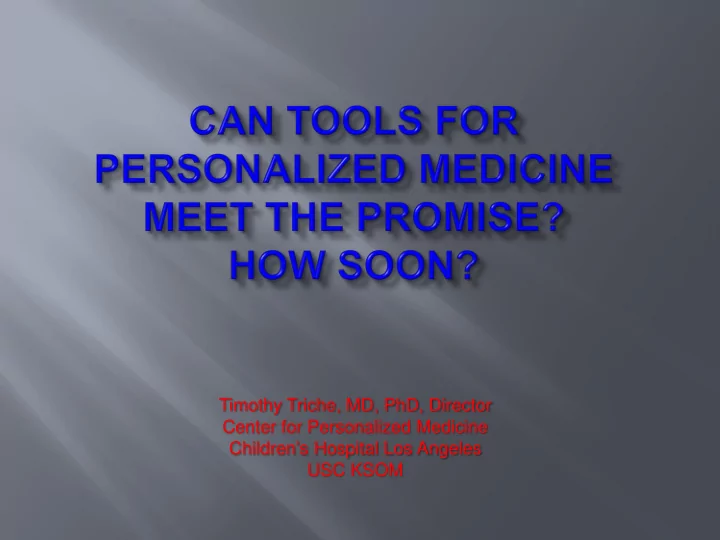

Timothy Triche, MD, PhD, Director Center for Personalized Medicine Children’s Hospital Los Angeles USC KSOM
Patient Clinical Healthcare Healthcare Drug Treatment Development Providers Payers Discovery Innovations Pharmaco- Clinical trial Personalized Objective Outcomes-based genomics stratification diagnostics diagnostics medicine Molecular Profiling Retrospective Companion Evidence-based Efficiency Knowledge-based biomarker diagnostics medicine improvement Targeted Clinical trial Reduced costs drug development analysis Systems biology Molecular imaging Disease therapeutics resource SNP’s Population Circulating Wellness management Translational genetics tumor cells programs Telemedicine medicine (CTCs) Allelic variability Personalized efficacy/dosing Source: IDC Health Industry Insights
Human Genome Research: Launched fundamental discovery and development that led to medical application Healthcare Transformation: New technology is only enabled when integrated with the clinical setting Time Line: Integrated efforts all launched in last 6 years Initial funding: between $100M -$200M Impact: Already leading to transformation of clinical care, self supporting research, innovative biotechnology spin-offs, and job and program growth.
Arizona: Translational Genomics Research Institute (TGen) Seattle: Institute for Systems Biology (ISB) Fox Chase Cancer Center: (new) Mayo Clinic: Center for Translational Science Activities Harvard/MIT: Broad Institute/ Foundation Medicine Cleveland Clinic: Genomic Medicine Institute (GMI) Ohio State University: Center for Personalized Healthcare Duke University: Institute for Genome and Science Policy El Camino Hospital: Genomic Medicine Institute The Scripps Research Institute (TSRI) Vancouver, Canada: PROOF
Breast cancer: Oncotype Dx detects 21 gene profile to guide chemotherapy strategies in individuals with low, intermediate and high risk of recurrence BRCA1/2 test identifies ~1/500 women with mutation associated with high risk of breast cancer, triggering frequent surveillance or preventive treatments HercepTest detects HER2 to identify 20-30% responders to Herceptin Colorectal cancer: UGT1A test guides dosage adjustment for 10% of individuals likely to experience toxicity from Camptostar (Irinotecan) KRAS mutation testing dictates use of Cetuximab Acute lymphoblastic leukemia: TPMT test guides dosage adjustment for 1/300 individuals likely to experience toxicity from Purinethol (mercaptopurine) Melanoma: BRAF mutation test identified patients who will likely respond to PLX2032
SOLID 5500: 500 GB $M (Q1 2011) Throughput 100,000.00 (Gb) 13 years 140 ~$3,000,000,000 SOLID 4 10,000.00 (Q1 2010) SOLiD 3 120 1,000.00 (Feb. 2009) SOLiD 2 100 100.00 SOLiD (May 2008) (Oct. 2007) 80 10.00 Moore’s 60 Law 1.00 40 0.10 20Gb <2 weeks 20 6Gb 3Gb 0.01 ~$1,000 0 0.001 2007 2008 2009 2010 1990 2001 2007 2009 2012 But the true cost, when data storage and analysis are included, is increasing: ‘the $1,000 genome that only costs $1,000,000 to analyze’
Company Method Thru-put Device Error Rate Read TAT Cost Length Roche 454 Amp Whole $500,000, good 500 2 days beads genome $100,000 (mode) Illumina Amp Whole $600,000 fair 75 11 days beads genome SOLiD Amp Whole <$500,000 better 75 8 days emulsion genome Helicos SMS Whole service high 35 8 days genome Pacific SMS Targeted $750,000 Very high >1,000 1 hour Biosciences Starlight SMS Targeted $750,000 Very high >2,000 ? Complete Amp Whole service high ? 1 week Genomics rolling O genome Ion Torrent Amp Targeted $50,000 fair 100-500 2 hours
But so far limited to inherited monogenic disorders in children
Whole Genome Sequencing Facts: Turn around time: • Machine time: > 8 days • Data alignment: days • Data interpretation: weeks Cost: • $10,000 for reagents • Data analysis: ? (much more) Complexity: • The normal human genome is riddled with anomalies that must be distinguished from disease associated abnormalities
>3 million germline SVs (~0.1% of genome) ~ 600 thousand per tumor ~ 30 thousand regions of LOH Similar number of regions of CNV Tumor LOH Somatic Unknown* Germline 1 20,700 10,648 650,045 3,112,663 2 32,622 10,257 533,029 3,104,337 3 42,250 7594 605,505 3,326,664
Whole exome sequencing is currently popular (low hanging fruit) Medical use will likely require targeted sequencing of DNA, RNA (as cDNA), and epigenomic features (methylated CpGs) Emphasis will be on sample prep, turn around time, data quality, and cost, not platform throughput
Affordable device, easy Low cost, convenient, set up, rapid TAT (2 hours single use chip on machine, <2 days total) 314: > 10 mbs 1/11 316: > 100 mbs 5/11 318: > 1,000 mbs 9/11
NGS-based diagnostic testing (mutations, CNV, LOH, InDels, translocations) Total RNA expression profiling (expressed mutations, splice variants, allele specific expression) for prognosis & stratified Rx Targeted sequencing (exome or user selected) Mitochondrial genome sequencing (with multiplexing) Prokaryote sequencing Metagenomics
Most frequently selected features: 6 ncRNAs 1 LOH 2 coding RNAs Rank Order:
LOH Expression
Most current medical applications are based on qPCR, Sanger sequencing, and microarry data ‘Next Gen Sequencing’ (NGS) Technology will contribute to true ‘personalized medicine’, but not in its current form Whole genome data is unlikely to be useful for most medical use until these challenges are met Promising platforms like the Ion Torrent Personal Genome Machine have already appeared, with more to follow (MiSeq, 454 Jr., etc) Targeted sequencing based on current discovery work is most likely to facilitate true ‘personalized medicine’ Broad use of NGS will require better data, better knowledge, and reduced turn around time at reduced cost
Recommend
More recommend